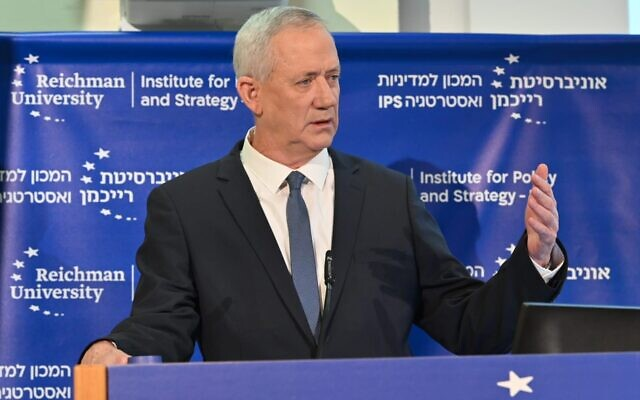
Gantz: Iran ‘weeks from enough fissile material for bomb,’ adding 1,000 centrifuges
Defense minister warns cost of dealing with Iran will be higher in a year; warns Tehran against transfer of advanced weapons to proxies; says Israel’s position on Ukraine ‘ethical’
By EMANUEL FABIAN 17 May 2022, 11:06 am
Defense Minister Benny Gantz speaks during a conference at Herzliya’s Reichman University, May 17, 2022. (Gilad Kvalarchik/Gilad Kvalarchik)
Defense Minister Benny Gantz warned on Tuesday that Iran is just a “few weeks” from accumulating sufficient fissile material for a bomb. It is also working to finish the production and installation of 1,000 advanced centrifuges enriching uranium, including at a new underground site at the Natanz nuclear facility, he said.
“Iran continues to accumulate irreversible knowledge and experience in the development, research, production, and operation of advanced centrifuges,” Gantz said during a conference at Herzliya’s Reichman University.
“It stands just a few weeks away from accumulating fissile material that will be sufficient for a first bomb, holds 60 kg of enriched material at 60%, produces metallic uranium at the enrichment level of 20%, and prevents the IAEA from accessing its facilities,” he added.Keep Watching
“During these very days, Iran is making an effort to complete the production and installation of 1,000 advanced IR6 centrifuges at its nuclear facilities, including a new facility being built at an underground site near Natanz,” he said.
Last month the head of the UN nuclear watchdog agency confirmed that Iran had set up a new centrifuge parts workshop at its Natanz nuclear facility.
International Atomic Energy Agency Director-General Rafael Grossi said the machines were moved from Karaj, near Tehran, to the new location, which he said was some three floors belowground, possibly to protect it from airstrikes.
The workshop had been set up in one of the halls of Natanz’s fuel enrichment plant, where Iran has thousands of centrifuges, Grossi said.
Natanz, in Iran’s central Isfahan province, hosts the country’s main uranium enrichment facility. (AP)
Iran’s centrifuge facility in Karaj was targeted in what Iran described as a sabotage attack in June. Natanz itself has twice been targeted in sabotage attacks, assaults that Iran has blamed on Israel.
Talks between Iran and world powers in Vienna to revive the 2015 nuclear deal have stalled. There is concern that Iran could be closer to being able to construct an atomic weapon if it chose to pursue one.
In this frame grab from Islamic Republic Iran Broadcasting, IRIB, state-run TV, three versions of domestically-built centrifuges are shown in a live TV program from Natanz, an Iranian uranium enrichment plant, in Iran, June 6, 2018. (IRIB via AP)
The nuclear deal collapsed four years ago when former US president Donald Trump withdrew the United States and imposed crushing sanctions on Iran. In the meantime, Iran has vastly expanded its nuclear work, while insisting that it is for peaceful purposes.
“The price for tackling the Iranian challenge on a global or regional level is higher than it was a year ago and lower than it will be in a year,” Gantz said.
The defense minister also said two Iranian drones downed over Iraq in February were intended to reach terror groups in the Gaza Strip or West Bank.
“The [Islamic] Revolutionary Guard [Corps] launched a pair of drones from Iran itself, towards Israel. Among other things, based on the fact that the UAVs had parachutes attached, we estimate that the purpose of the launch was to parachute them into the Gaza Strip or Judea and Samaria and for them to be collected by terrorist organizations,” he said.
An Iranian Shahed-136 drone is launched during a military exercise in Iran, December 2021. (Screenshot: Twitter)
The Israel Defense Forces has confirmed it intercepted at least four other Iranian drones heading for Israel or the West Bank and Gaza Strip in recent years.
The defense minister warned that Iran’s attempts to transfer “accurate munitions” to its proxies, including via Syria, were continuing. “Israel will continue to halt these efforts and prevent the threat to its citizens and the region,” he said, days after an airstrike in the northwestern Masyaf area of Syria was attributed to Israel.
“The quantity of this strategic weapon in the hands of Iranian emissaries has increased significantly in the past year,” Gantz said. “In Iraq, there are hundreds of [munitions]; many dozens have been added this year. In Yemen, the number of [munitions] has increased in the past year, and the Houthis hold dozens of them.”
Speaking on Russia’s invasion of Ukraine, Gantz said Israel was in the right place “ethically and strategically,” adding that he supports transferring additional defensive equipment to Ukraine.
Israel has avoided aligning too closely with either side since Russian troops invaded Ukraine on February 24. It is one of the few countries that maintains relatively warm relations with both Ukraine, a fellow Western democracy, and Russia. However, the rhetoric coming from Jerusalem shifted in the wake of the reports of widespread civilian killings by the Russians and comments by Russian Foreign Minister Sergey Lavrov claiming that Adolf Hitler had “Jewish blood.”
While Jerusalem has increasingly shifted its tone to align more with Western powers, it has so far steadfastly declined to contribute to the Ukrainian military effort, instead sending humanitarian aid and defensive equipment to be used by emergency services.
Gantz said supporting Ukraine must not come at the cost of Israel’s “broad operational considerations, which are also an anchor for regional stability.”
Israeli strikes have continued in Syrian airspace, which is largely controlled by Russia, even as ties with Moscow have deteriorated in recent weeks. Israel has found itself at odds with Russia as it has increasingly supported Ukraine, while seeking to maintain freedom of movement in Syria’s skies.
Agencies contributed to this report.
No comments:
Post a Comment